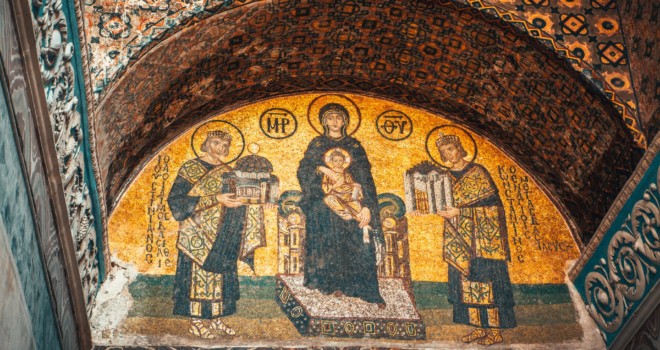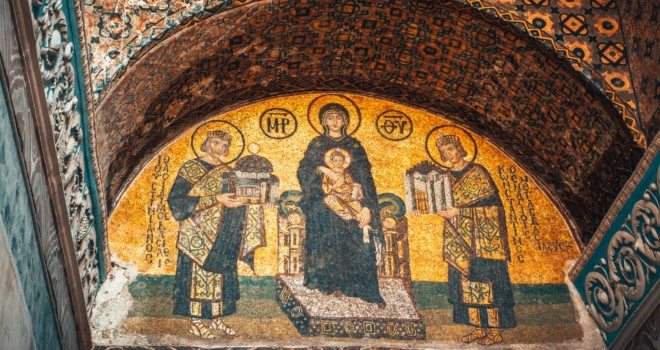It is most appropriate to refer to reverence as the “mother” of all virtues, for it is the image of the mother revering the delicate beauty of her newborn child that offers us its most convincing example. Nonetheless, as a society, we have lost respect for reverence. Paul Woodruff has written Reverence: Renewing a Forgotten Virtue (Oxford University Press, 2001) in which he contends that we have not lost the virtue of reverence entirely, for this would be “too grievous to bear”. What he maintains is that what we have lost “is not reverence but the idea”. The aim of his book, therefore, is to retrieve the idea of reverence from the obscurity into which it has fallen.
Society’s loss of the “idea” of reverence may very well be connected with society’s lack of reverence for the mother. Motherhood is now an option, not a great honor that unites her with her child as well as with God. Dietrich and Alice von Hildebrand, in their book, The Art of Living, define reverence as “the attitude which can be designated as the mother of all moral life, for in it man first takes a position toward the world which opens his spiritual eyes and enables him to grasp values”. The world prizes being “open-minded,” though it ignores what an open mind sees, but it neglects being “open-hearted” which allows a person to see and respect that which is good.
The irreverent person lacks the ability to subordinate himself to anything higher than himself. He is a prisoner of his ego, constantly looking for things that are self-satisfying. Acquisition, achievement, and prestige are of primary importance to him. In his exclusive preoccupation with himself, he deprives himself of enjoying the wonders of creation.
Reverence requires self-forgetfulness and silence. It allows us to awaken to the beautiful things that exist beyond the reach of our egos. Whittaker Chambers had one of these self-forgetful and silent moments when he noticed the delicate convolutions of his little girl’s ears. “At that moment,” he wrote in his autobiography, “the finger of God was first laid upon my forehead”. It was an epiphany that led him out of atheistic communism and into the world of Christianity. None of his communist comrades ever provided him with a better lesson.
These convolutions, he realized for the first time, were not the product of chance, but the work of a benevolent Creator. He dedicated his life’s story, Witness, to his children whom he urged to cultivate and practice the virtue of reverence. Reverence, he also maintained, is, indeed, the mother of all virtues. Without that special respect for the things that we did not make, we remain shut up in our lonely selves, deprived of a true appreciation for the beauty of both nature and other people.
Psalm 131, the shortest of them all, is nonetheless one of the most powerful: “I do not occupy myself with things too great and too marvelous for me. But I have calmed and quieted my soul, like a child quieted at its mother’s breast.” In such moments of quietness, one begins to see and appreciate the handiwork of God. The world is a perfect environment for teaching us how to worry. There is a far better lesson to be learned while holding an infant. In this oasis, one is refreshed by a sense, however dimly felt, that there is a higher realm to which we are all invited. The reverent attitude is a way of reminding of this.
The silence of a newborn babe can be more eloquent than the oratory of the most learned professor. We cannot debate what the child teaches us. It is definitive and irrefutable.
Beauty will save the world, wrote the Christian existentialist, Nikolai Berdyaev. Art, in its highest form, is the incarnation of beauty. John Keats, who had an extraordinary sense of reverence, tuned his spiritual powers to a Grecian Urn and saw marvelous things: “Heard melodies are sweet, but those unheard are sweeter; therefore, ye soft pipes, play on; not to the sensual ear, but, more endear’d, pipe to the spirit ditties of no tone”.
Now, if Keats can find inspiration when he examines the story that is etched on a Grecian urn, how much more inspiration can a mother find when she gazes into the face of her newborn child? Reverence opens the world to wondrous things. G. K. Chesterton expressed the matter superlatively when he posed the question, “If seeds in the black earth can turn into such beautiful roses, what might the heart of man become in its long journey toward the stars?”
Reverence opens the gateway to the stars, and to God, who is our lasting home.
✠
Photo by Raimond Klavins on Unsplash













